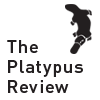A moderated panel discussion and audience Q-and-A on problems of strategies and tactics on the Left today, held on November 6, 2007, at the School of the Art Institute of Chicago. Panelists: Michael Albert (Z Magazine, author of Parecon: Life After Capitalism), Chris Cutrone (Platypus), Stephen Duncombe (Gallatin School of New York University, editor of Cultural Resistance Reader), Brian Holmes (Continental Drift and Université Tangente), and Marisa Holmes (new Students for a Democratic Society).
"After the failure of the 1960s New Left, the underlying despair with regard to the real efficacy of political will, of political agency, in a historical situation of heightened helplessness, became a self-constitution as outsider, as other, rather than an instrument of transformation. Focused on the bureaucratic stasis of the Fordist, late 20th Century world, the Left echoed the destruction of that world by the dynamics of capital: neoliberalism and globalization.
The idea of a fundamental transformation became bracketed and, instead, was replaced by the more ambiguous notion of 'resistance.' The notion of resistance, however, says little about the nature of that which is being resisted, or of the politics of the resistance involved.
'Resistance' is rarely based on a reflexive analysis of possibilities for fundamental change that are both generated and suppressed by the dynamic heteronomous order of capital. 'Resistance' is an undialectical category that does not grasp its own conditions of possibility; it fails to grasp the dynamic historical context of capital and its reconstitution of possibilities for both domination and emancipation, of which the 'resisters' do not recognize that that they are a part."
— Moishe Postone, "History and Helplessness: Mass mobilization and contemporary forms of anticapitalism" (2006)
Transcripted in Platypus Review #4 (Click below):


